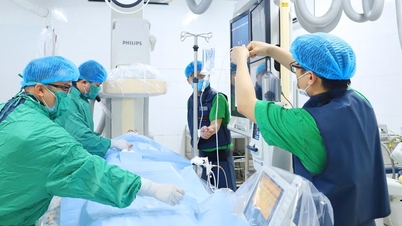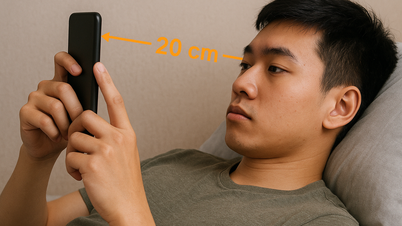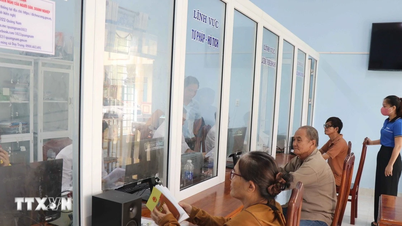A good night’s sleep not only helps the body restore energy but also acts as a “shield” to protect metabolic health and vice versa. A study published in the journal Diabetes Care found that sleeping too little – especially in postmenopausal women – can increase the risk of insulin resistance and lead to type 2 diabetes.
When lack of sleep becomes the "hidden culprit"
Research conducted by Dr. Marie-Pierre St-Onge's team at Columbia University (New York) shows that prolonged sleep deprivation directly affects the ability to produce and use insulin - a hormone that plays a key role in controlling blood sugar.
“Getting enough sleep each night not only helps maintain energy, but is also key to blood sugar control and reducing the risk of type 2 diabetes, especially in postmenopausal women,” Dr. St-Onge emphasized.
It is worth noting that most previous research on the link between sleep and diabetes has focused on men. Meanwhile, women are the group most vulnerable to sleep disorders due to physiological changes throughout life: pregnancy, childbirth, child rearing and menopause. In fact, many surveys show that the proportion of women who feel they do not get enough sleep is higher than men.
The research team recruited 38 women aged 20-75, with healthy sleep habits (7-9 hours/night) and normal blood sugar. All had high cardiovascular risk factors such as being overweight, obese, having high blood lipids or a family history of diabetes.

Volunteers had their sleep habits monitored using wristband sensors and sleep diaries for two weeks, then underwent two six-week experimental phases:
Adequate sleep stage: maintain an average of 7.5 hours of sleep/night.
Sleep deprivation stage: delaying bedtime by 1.5 hours but still waking up as usual, reducing sleep duration to about 6.2 hours - roughly equivalent to the current American average.
At the beginning and end of each period, they underwent an oral glucose tolerance test (OGTT) to measure blood sugar and insulin response, and an MRI scan to check body fat.
The results showed that in the sleep-deprived group, insulin resistance increased by an average of 14.8%. In postmenopausal women, the increase was even higher - up to 20.1%. In other words, sleep deprivation causes the body to need more insulin to control blood sugar.
Fortunately, when returning to adequate sleep (7-9 hours/night), insulin and glucose levels also gradually normalize.
Why does lack of sleep disrupt blood sugar?
Insulin is responsible for moving glucose (sugar) from the blood into cells to create energy. When the body resists insulin, glucose gets “stuck” in the blood, increasing the risk of prediabetes and type 2 diabetes.
Although the mechanism is not completely clear, scientists have proposed several hypotheses:
- Lack of sleep changes biological rhythms, disrupting energy metabolism.
- Lack of sleep increases the stress hormone cortisol, which triggers the “fight or flight” response, making the body process glucose less efficiently.
- Lack of sleep can cause inflammation, affecting insulin function.
- In addition, changes in fat distribution are also a potential factor.
According to Dr. Sun Kim (Stanford University, California), insulin resistance does not immediately mean diabetes. However, it is a "warning" step because it is related to a series of other risks such as high blood pressure, blood fat, cardiovascular disease and even some types of cancer.
Lack of sleep - a double burden for menopausal women
Women entering menopause often suffer from insomnia due to hormonal changes, hot flashes, and mood disorders. When sleep quality is already poor, the risk of insulin resistance and metabolic disorders increases.
“If this condition persists, prediabetic women may progress more rapidly to type 2 diabetes,” Dr. St-Onge warns.

This explains why taking care of sleep in middle-aged women is not only to improve mental health but also an important factor in preventing chronic diseases.
How to protect sleep - protect health?
The good news is that the effects of sleep deprivation are reversible. When study participants returned to a regular sleep schedule, their insulin and glucose levels improved significantly. This suggests that sleep is a powerful, natural “medicine.”
Some ways to improve sleep recommended by experts:
Keep a consistent sleep schedule: go to bed and wake up at the same time every day, including weekends.
Avoid caffeine, alcohol, and spicy foods before bedtime.
Do not eat too much at night, especially before going to bed.
Exercise regularly: yoga, brisk walking, swimming or cycling at least 30 minutes, 3 times/week.
Relax your mind: meditate, take deep breaths or listen to soft music.
Limit electronic screens: turn off phones and tablets at least 1 hour before bed.
Create the ideal sleeping space: cool, dark and quiet room.
In addition, you can take advantage of natural remedies such as using lavender, jasmine, lemongrass essential oils... to relax, help reduce stress, and aid sleep.
Supplement foods rich in magnesium, vitamin B and tryptophan (almonds, kiwi, salmon, walnuts) to increase melatonin production - a hormone that regulates sleep.
Using natural sedative therapies from chamomile tea, lotus tea, passionflower tea; ginkgo biloba and blueberry helps improve brain circulation and reduce oxidative stress./.
Source: https://www.vietnamplus.vn/ngu-qua-it-lam-gia-tang-nguy-co-mac-benh-tieu-duong-o-phu-nu-post1061713.vnp





![[Photo] National Assembly Chairman Tran Thanh Man attends the inauguration ceremony of the Memorial Site of National Assembly Standing Committee Chairman Bui Bang Doan](https://vphoto.vietnam.vn/thumb/1200x675/vietnam/resource/IMAGE/2025/9/28/6feba23492d14b03b05445dd9f1dba88)





























































































Comment (0)